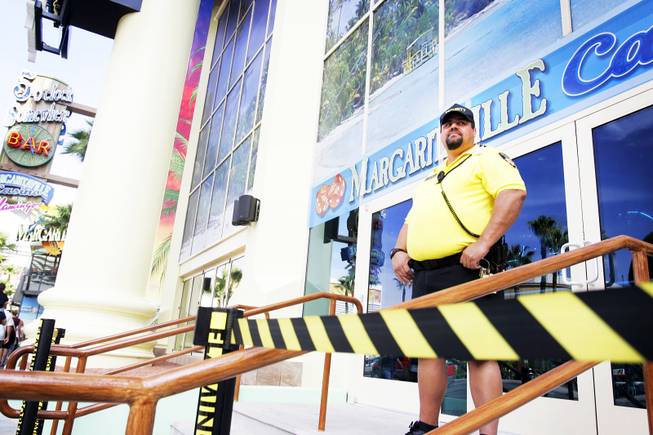
Stewart Homnack, of the Flamingo security crew, guards the Strip entrance to the new Margaritaville casino inside the Flamingo on Friday, Sept. 30, 2011.
Friday, March 24, 2017 | 2 a.m.
Acts of terror may be happening more frequently in tourism hot spots around the world, but visitors to Las Vegas are coming to one of the safest destinations in the U.S., a Wynn security official said to a gathering of hospitality executives at the Mandarin Oriental Thursday.
John Choate, executive director of security at Wynn and Encore, spoke to the monthly meeting of the Las Vegas Hospitality Association about security issues in Las Vegas.
“While the threats are out there, we still have all the mitigating measures in place right here,” he said, “And people should feel very, very safe coming to Las Vegas.”
Choate’s confidence in making such a sweeping statement possibly comes from a professional background in both handing out and protecting people from extreme violence.
A Naval Academy graduate, Choate served as a Navy Seal for 12 years. After leaving active duty, Choate said, he went to work for a CIA front company that assessed security vulnerabilities at major public facilities around the country, like water treatment plants and airports.
He then worked for and started other security focused companies, including one that provided protection for wealthy executives like Steve Wynn. That work led to his position as head of security for Wynn Las Vegas and Encore.
During his speech, Choate made the point that security is the basis for everything else that happens in Las Vegas by describing a conversation he had with Wynn Resorts CEO Steve Wynn.
“In December of 2015 we called a security summit and Mr. Wynn asked a question of me and the group. The question was very, very specific. He said, ‘John, what is the worst thing that could happen to my hotel.”
“And I would say the worst thing would be for it to be destroyed and crumble to the ground. But I don’t think that’s what he was asking.”
“I asked him a question In return. I said, ‘What I want you to imagine is this: Somebody walks into any entrance to any of your hotels and they have, let’s say just a handgun, and all they do is point to the ceiling and shoot six bullets. They don’t aim at anyone in particular and nobody gets hurt. What is your business like the next day?’
“It becomes a virtually irrecoverable business event,” Choate said, answering his own question. “It’s something that cannot be tolerated.”
Fortunately, Choate said, Las Vegas’ tourism corridor has multiple resources to draw on when it comes to security. They include special sections of Metro that specifically address the Las Vegas Strip, the Southern Nevada Counterterrorism Center (which is staffed by agencies from the FBI to police departments to even Nevada Park Rangers), Metro’s SWAT team, an FBI SWAT team and numerous other police agencies.
“There is not a day goes by that anything which is remotely deemed as a security threat or concern is not robustly addressed by multiple parties at once,” Choate said. “The sheer number of first responders, of law enforcement, of medical responders in Las Vegas is absolutely extraordinary.”
He also explained that security departments from the various casinos do not operate in silos but work together if only because the gun incident he described to Wynn would affect business for everyone.
“These aren’t little tribal pieces in separate casinos,” he said. “It’s one system. We are Las Vegas, and the harm to one is harm to all.”
While he extolled Las Vegas’ security apparatus, Choate made a point of explaining to the executives at the luncheon that security should not be looked at as a cost center but as a revenue generator and used Disney resorts’ installation of metal detectors as proof.
“The reality of the situation is every single day from (when they installed them) onwards Disney's attendance has gone up. And it begs the question of why,” he said. “It’s because people were actually not going because of perception of fear they had.
“This city and state lives and thrives or dies because of the hospitality economy,” Choate said. “The security aspect we require it. We need it. For everyone else to exist, we need to do our job.
“Yes, there are people that want to do bad things to good people, that’s just the way it is. But there are also people who really enjoy doing bad things to bad people.”

Join the Discussion:
Check this out for a full explanation of our conversion to the LiveFyre commenting system and instructions on how to sign up for an account.
Full comments policy